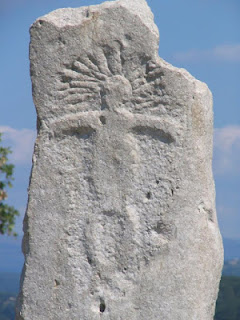“In the land of Uz there lived a man whose name was Job. This man was blameless and upright; he feared God and shunned evil.” (Job 1:1)
Alice C. Linsley
The land of Uz is named for the Horite Hebrew clan of Uz. Uz was a son of Dishan, a son of Seir the Horite Hebrew ruler who is mentioned in the Genesis 36 list of Edomite rulers. The relationship of the Uz clan to Seir the Horite is shown on the diagram above.
Seir was a ruler in ancient Edom long before there was a king in Israel (Gen. 36:31) The Edom-Horite Hebrew connection is evident in Lamentations 4:21 - "Rejoice and be glad, O daughter of Edom, that dwells in the land of Uz…”
In the book of Job, the last of Job's kinsmen to speak is Elihu, whose name means "word of God". El – is an ancient word for God, and Hu refers to the authoritative word in ancient Egyptian. (Pyramid Texts Utterance 251, and Utterance 697). Here we find a concept of the Divine Word that is similar to the Logos of John's Prologue.
Elihu was of the clan of Buz. Buz, Huz and Uz represent a three-clan Hebrew confederation. 1 Chronicles 5:14 says that the son of Buz was Jahdo (Yahdo), and Jahdo's son was Yeshishai, the Aramaic form of Yeshua/Jesus.
Most Old Testament scholars believe the book of Job was written between the 7th and 4th centuries BC long after the time that Job would have lived. However, the book reflects more ancient Horite Hebrew customs and beliefs. Job is portrayed as a righteous ruler-priest who offers sacrifices daily to cover the sins of his family members. His connection to Seir the Horite ruler of Edom also connects him to the royal house of David whose hometown of Bethlehem was a Horite Hebrew settlement. That is why the Ark of the Covenant rested for 3 months on the property of Obed-Edom in Bethlehem. Obed was the first-born son of Boaz and Ruth. He is the grandfather of David.
In 1 Chronicles 26:4 some of the Temple doorkeepers are designated "sons of Obed-Edom". Salmon, who married Rahab, is called the "father" (elder/chief) of Bethlehem in 1 Chronicles 2:54, and Hur (Hor) is named a "father" of Bethlehem in I Chronicles 4:4.




